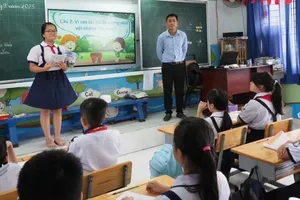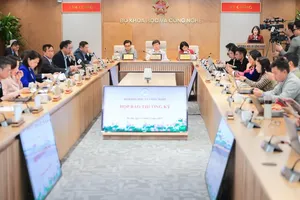
Deputy Minister of Science and Technology Bui The Duy shared that even though the goals in the national strategy for researching, developing, and applying AI in Vietnam until 2030 are quite challenging, they are feasible as being administrated by the three ministries of Science-Technology, Information-Communications, and Education-Training.
“The collaboration of these three ministries displays our belief that human resources training is the vital factor for the growth of science-technology, in particular AI, in Vietnam”, said the Deputy Minister.
He added that the priority of AI implementation at present is in the fields of national defence, public healthcare, and environment – natural resources management.
On March 31, the International Center for AI Research – a cooperation between Hanoi University of Science & Technology and Naver Group from the Republic of Korea – formally came into operation. The center is a hub for all AI research units, boosting the link with international counterparts, especially those in developed countries.
This center not only conducts foundation studies to develop ‘Make in Vietnam’ core programs but also promotes the implementation of AI in various fields in life so that the digital transformation process can be more effectively sped up in the nation.
The center’s Director – Prof. Ho Tu Bao – commented that there is a wide gap in AI research between Vietnam and other developed nations like the US or Japan. However, this gap is gradually narrowed thanks to talented human resources in the country, who have gained much experience working in international corporations. Therefore, the missions raised in the national strategy are achievable.
In a similar effort to upgrade the level of AI power in Vietnam, FPT Group and Mila – Quebec AI Institute formed a cooperative relationship via a strategic agreement for the period of 2020-2023 in the middle of 2020. Signing this agreement is an important action to provide FPT Group with more opportunities to work with global AI giants like Google, Microsoft.
At the same time, FPT Group received the approval of Binh Dinh Province People’s Committee to create a large-scaled AI educational center here. This center is expected satisfy the demand of high-quality human resources on AI and other high technologies for the whole country.
Sharing the same determination, many major Vietnamese technological enterprises such as Bkav, Vingroup, Viettel, VNPT, CMC have poured much capital into the implementation of AI technology in manufacturing activities and the digital transformation process.
Obviously, AI has allowed automation in several stages of an organization’s operation, especially in the time of Covid-19 pandemic. It has saved much money while greatly boosting the work performance in these units.
Seeing such an impressive achievement, technological companies in Vietnam now aim at a higher goal of brining AI to the general public via international-leveled applications and products.
























